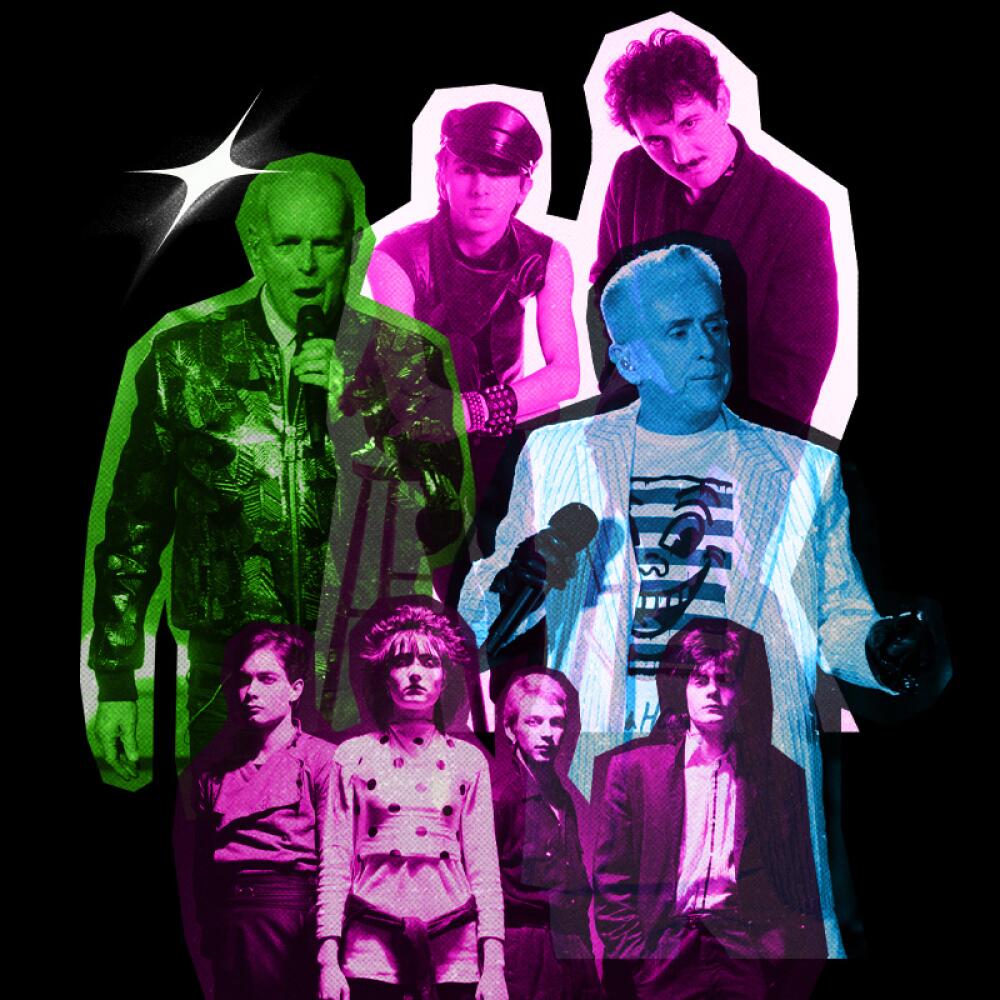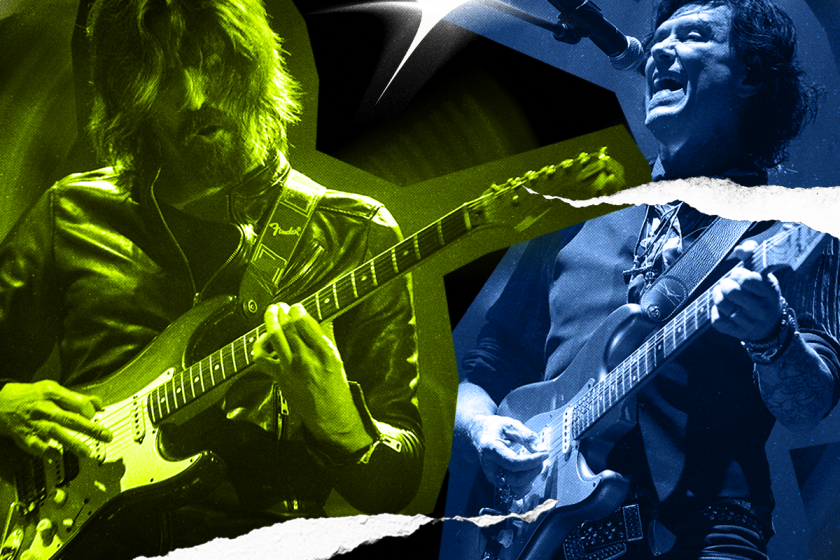
- Share via
In the year since its publication, “A Kiss Across the Ocean: Transatlantic Intimacies of British Post-Punk and US Latinidad” has connected me with fellow admirers of Siouxsie and the Banshees, Bauhaus, Soft Cell, Frankie Goes to Hollywood and Pet Shop Boys. From Esther in Scotland and Steven in San Francisco, Joe in Ensenada to Mayra in L.A., this labor of love has done what I set out to accomplish in writing it: to bring people together based on the singers and bands we similarly love.
Moreover, just as composing the book rescued me from some dark moments during the height of the COVID-19 pandemic, I would learn at readings and lectures throughout the U.S. that my illustrations of how songs like “Spellbound,” “Double Dare,” “Tainted Love,” “Two Tribes,” and “Domino Dancing” came to my emotional rescue during my teenage years resonated with countless other fans.
For the Latinx community, British post-punk music (sometimes called new wave or alternative) has become, as Welsh writer Raymond Williams defined culture, a whole way of life. From Facebook fan pages offering insights about the music to the two Cruel World music festivals held in Pasadena where brown bodies swayed to their favorite bands and singers from across the pond, it’s impossible not to recognize this deep connection.

Despite the commonly held belief that these fans are geographically confined to Southern California, they also exist in Chicago, San Antonio, Miami, San Francisco and New York. Ranging from teens who self-identify as “goth” to middle-aged fans who at one time may have embraced descriptors like “deathrocker” or “mod” (but are now content putting comfort before fashion), they are Chicanos, Puerto Ricans, Salvadorans, Mexicans, Cubans and Colombians, to name only a few, whose musical tastes are not at odds with their cultural identities but rather tethered to them.
Some of these fans are longstanding friends, but others came into my life thanks to “A Kiss Across the Ocean.” They have repeatedly expressed their appreciation for the book, and how it is a cultural history of the music they deeply connect with and a memoir inspiring their own introspection.
Naming a passion that they too were told was peculiar or isolated is part of the intimacy the book embraces as it endeavors to break down simplistic assumptions about the way bonds are created and solidified across social differences. “A Kiss Across the Ocean” is, after all, a response to the return to essentialist politics in which the boundaries of identity are heavily policed.
Additionally, it challenges the knee-jerk charge of cultural appropriation that too often thwarts understanding histories of collaboration and mutual exchange. This kind of gatekeeping recalls those condescendingly opinionated individuals I’ve encountered over the years who maintained that this music isn’t for me because I’m not white.
Rock en español in Southern California generated a vibrant “Rock Angelino” scene that brought together Latin American immigrants and U.S.-born Latines of different generations.
Cultural exchange in music is hardly new, and neither is the desire to transcend the restrictions imposed on us that intend to tell us what music we can and can’t listen to. My parents and their siblings who grew up in Orange County in the 1950s and 1960s, where the history of racial segregation continued to permeate educational institutions, work settings and everyday life, found solace in music by the Beatles, the Rolling Stones, Gerry and the Pacemakers, the Animals, and many other bands from the first “British Invasion.”
This music — alongside an emergent Southern California Chicano rock and roll scene in which my father and uncles participated — did not erase their Mexican American heritage but rather bolstered it; it showed that their histories and identities were much more complex than what those critics from outside, and sometimes from within their social circles, could ascertain. It was a means of belonging for those similarly and collectively moved by music that was unquestionably theirs.
Those of us who gravitate to the sounds exceeding the comprehensible scope of those naysayers with their collective anxiety-ridden side-eye have learned to pay little regard to those unfamiliar with or disdainful of the music that quite literally, to riff on the lyrics of the Smiths’ “Rubber Ring,” made us cry and saved our lives. And knowing full well that while the Smiths and Morrissey (save the latter’s cringe-worthy nativist politics) are or have been important to the musical repertoire that soundtracks our worlds, the range of performers is just as varied and complex as the music that gets called “‘80s” and indelibly exceeds the inadequate confinement of a genre or a decade.
‘When I first started playing folk music, people would look at my cowboy boots and be like, “Wow… so how did that happen?” ’
As evidence of the music’s reach beyond the 1980s and examples of the “transatlantic touch” between Latinx audiences and expressive culture and British post-punk musicians that didn’t make it into the book, one might consider the Plugz and Los Lobos opening for Public Image Limited in 1980 at the now-defunct Grand Olympic Auditorium in downtown L.A.; Pet Shop Boys’ sampling of Argentina’s Los Fabulosos Cadillacs’ 1993 single “El Matador” for their 1996 song “Single-Bilingual”; blue-eyed soul singer Paul Young’s recent band composed of various British musicians who admire and perform Tex-Mex conjunto music under the name Los Pacaminos; the Instagram platform phenomenon known as Los Goths Co. with its recategorization of goth as “soy darks”; and the weekly East L.A. dance party titled “The Breakfast Klub” with nocturnal homages to Siouxsie and Soft Cell as part of its celebratory intent.
Readers of different generations relate to the book on diverse levels, yet their love for the music spotlighted ultimately serves as the unifying factor. But while it is indeed the music that lies at the heart of the book, I wish to additionally emphasize the several moments of intimacy indexed throughout.
It is the importance of intimacy — how we might attain it in times of despair and bolster it when our hope appears on the brink of faltering — that I hope my reader takes away from the book and to which they hold close in the face of limiting expectations.
Rodríguez is professor of English at the University of California, Riverside. He is the author of “Next of Kin: The Family in Chicano/a Cultural Politics” (2009) and “A Kiss Across the Ocean: Transatlantic Intimacies of British Post-Punk and U.S. Latinidad” (2022), both published by Duke University Press. Born and raised in Santa Ana, Calif., he is currently finishing a book of poems— “Exemplars and Accomplices” — about his time living in Chicago.
More to Read
The Latinx experience chronicled
Get the Latinx Files newsletter for stories that capture the multitudes within our communities.
You may occasionally receive promotional content from the Los Angeles Times.








